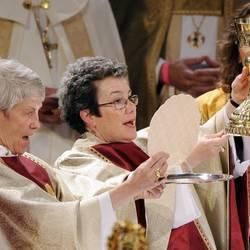Austria: Martha's Mass Risks Excommunication
By Giacomo Galeazzi
Martha Heizer, teacher of religion in Innsbruck, co-founder and director of "We are Church", challenges the Vatican and announces her intention to celebrate Mass even at the risk of excommunication. In reality, the issue is definitively closed as a result of the answer of the then prefect of the former Sant' Uffizio, Jospeh Ratzinger, about the doctrine of the apostolic letter "Ordinatio sacerdotalis". Doubt was raised regarding the faculty of the Church to confer sacerdotal ordination to women. The "no" of the doctrine to women priests, clarified the current Pontiff, is "definitive" because such doctrine is founded on the Word of God written and constantly preserved and applied in the Tradition of the Church from the beginning. The doctrine has been proposed infallibly by the ordinary and universal Magisterium (dogmatic constitution "Lumen gentium" by the Second Vatican Council). Rooted in the New Testament, the Christian sacerdotal ministry, from the beginning, was conferred only to men. The Tyrolean theologian Martha Heizer and her group of believers propose to render the Eucharist possible without clergymen, thanks to private forms of celebration. It is a procedure that needs to be referred immediately to the Holy See because it figures among the delicta graviora. "The seven points contained in the appeal to disobedience by the parish priests promoting the Pfarrer-initiatives are to be examined individually and not like a package," emphasizes Adista, the catholic news agency. "Communion to re-married divorced people, for example, could be granted only under determined conditions." In April of 1995, a small group of Innsbruck Catholics, led by Thomas Plankesteiner and Martha Heizer, promoted an "Appeal from the people of God" in five points (more democracy in the Church, greater role of women, optional celibacy for the priests, different sexual moral). It was appealed directly to the hierarchy of the Catholic Church hoping to obtain concrete answers. The agreement to the appeal was very broad in Austria (505,000 signatures, 1,800,000 in Germany), while it was a little less in other European countries, but still in the tens-of-thousands (35,000 in Italy). The signatures were delivered to the Vatican in the October of 1997 by approximately five-hundred delegates from all over Europe. A letter to Pope Wojtyla was written, but he did not answer. "None of the proposed reforms has been put into effect but, in spite of the frustrations from this failure, which was somehow expected, an international movement has been born", reports Adista. The acronym is IMWAC (International Movement We Are Church) and it is composed by national chapters ("Noi Siamo Chiesa" in Italy, Somos Iglesia in Spain, Wir Sind Kirke in the German speaking countries, Nous Sommes aussi L'Eglise in France, We Are Church in the United Kingdom and USA). Last July, the issue of female ordination had been reason of controversy also in Portugal. Cardinal José Policarpo, Patriarch of Lisbon, was forced to release a letter to emphasize that on the sacerdotal ordination of women he is "in communion with the Pope". The Patriarch had to face the controversy provoked by some of his declarations ("there is no fundamental theological obstacle" to the ordination of women, although he emphasized that "there is no Pope who has power on this subject. It would create tensions, if God wishes it to happen, and if it is God's plan, it will happen.") In his explanation, Cardinal Policarpo recognized that he "had never dealt systematically the issue." And he specified, "The fact that there are no women among these successors and cooperators does not mean a minimizing of women, but rather it is intended to complement the differences between males and females, which is fully realized in the relationship between Christ and Mary." At the beginning of the Church, emphasizes the Cardinal, "there was harmony between the apostolic priesthood conferred upon men and the importance and dignity of women in the Church." For Cardinal Policarpo, one of the causes for the demand of female priesthood is the "loss of awareness of the sacerdotal dignity of all the Church members, reducing the ministerial expression only to ordained priesthood." In any case, the more recent Papal Magisterium interprets this uninterrupted tradition of only ordering men "not only like a practical way to proceed, that can change with the rhythm of the action of the Holy Spirit, but like the expression of the Mystery of the Church, that we must receive with faith". Therefore, "we are invited to adhere to the Magisterium of the Holy Father, in the humility of our faith, and we will continue to study in depth the relationship of the ministerial priesthood to the priestly nature of the entire People of God and to discover the feminine way of building the Church, in the decisive role of the mission of women." In conclusion, we hope Martha understands that one Mass is not worth excommunication.
|
.
Any original material on these pages is copyright © BishopAccountability.org 2004. Reproduce freely with attribution.
